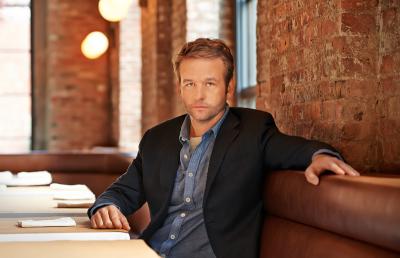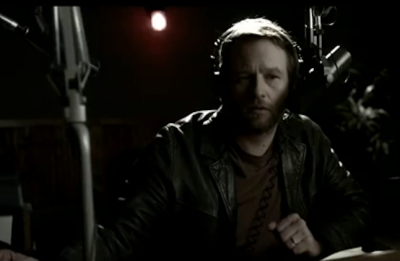By: debbie lynn elias
Always a joy is Dallas Roberts. Be it on screen or off, his passion for his craft comes across loud and clear. In his latest film, the supernatural thriller SHADOW PEOPLE, as talk show radio host Charlie Crowe, Roberts delivers a tour de force performance of fear that had even crawling out of my skin. Written and directed by Matthew Arnold, SHADOW PEOPLE is based on the true stories of the 1980’s wherein hundreds of people literally died from fright through a combination of the physical condition known as “sleep paralysis” and the legendary but very real, centuries old SHADOW PEOPLE. Researchers have linked the shadowy figures as being a phenomenon of the real life disease, Sudden Unexplained Nocturnal Death Syndrome.

SHADOW PEOPLE focuses on the story of a Kentucky talk show radio personality, Charlie Crowe, who first receives frantic on-air calls from a listener warning about the SHADOW PEOPLE but dismisses them as a hoax; that is, until the man and others listeners start turning up dead. Suspicious and with growing alarm, especially when he starts seeing the SHADOW PEOPLE himself, Crowe starts to investigate the phenomenon, as does CDC researcher Dr. Sophie Lacombe. Although at odds over the existence of SHADOW PEOPLE, both have the same goal – to find out what’s led to all the deaths. As Charlie’s fears and encounters with the phenomenon grow, their investigation leads them to some lost film footage of medical experiments performed in 1971.
Always great to catch up with Dallas Roberts (our last interview was in 2012 for The Grey), I had a chance to speak with him in this exclusive interview about SHADOW PEOPLE and things that scare the hell out of you in the night.
After The Grey last year and now SHADOW PEOPLE, I have to ask – what is this with you? You keep churning out these great performances. And here with SHADOW PEOPLE you totally creeped me out!
[laughing] Thanks very much! It‘s a creepy subject.
Did you know anything at all about the history of this, and about sleep paralysis and nocturnal death syndrome when you came into this project?
No, I didn’t. I came to it sort of the way everybody comes to it. I read the script and that led me to the internet and then that led me into really sort of scary places there for awhile. It‘s rooted in reality as much as I can tell.
I’m familiar with the sleep paralysis because I’ve actually experienced that. And it is very freaky when it happens.
Oh really? That sounds like it would be freaky enough without the people in the corner.
And then the people in the corner! I shudder thinking about it. Where you really got me with SHADOW PEOPLE is the scene of your character, Charlie Crowe, sitting in the living room, the tv is off, and youfre looking at the reflection in the dark of the tv and a shadow was behind you being reflected on the black tv screen. I was a goner. [Dallas laughing hysterically.] And the look on your face, you really, you kept your performance as Charlie grounded and sane without going over the brink into insanity. How did you develop that? That‘s a very fine line to walk in a film like this.
I guess you want to lend yourself to the sleeplessness and to the growing sense of what he‘s being sort of taken over by, but it is that line. You don‘t want to tilt it too far or else it can get unintentionally funny really fast.

In preparing for a role like this, because you need that immediacy and bit of unpredictability and reaction, how do you go about with rehearsal so you’re not over rehearsed and to get that spontaneous shock factor that you need?
We’ve all sort of been there. If you just sort of remember being 5 and all, the darkness in the corners would make your skin crawl. I still find for no apparent reason that when I go out to take the garbage out at my dadfs house, the house that I grew up in, I run back to the house. I’m 42 years old now but I still have a little sort of jolt in me from those old fears creeping up. You just stay in touch with that and hopefully it comes across.
Is that what you thought of when you had to get the bejeezus scared out of you? Your dad‘s house and taking out the garbage?
[laughing] I didn’t think about that so much [but more] whenever you’re in a situation where a noise is not a good event, you think about being in a hurricane and having the roof start to lift off and hearing that creak. I would think about my kids and a car, running across the street; just anything that elevates your blood pressure a little bit.
Did you look at any of the videos that are available specifically dealing with the actual radio call ins?
I didn’t. I tried to stay as far away from that as I could until I got done doing the job just because I didn’t know how to inhabit this guy from the outside. I tried to get it from the inside. I winged it mostly and immersed myself in other peoplefs experiences of it but as for the actual events, I tried to stay clear of them until I was done.
You and Alison Eastwood [Dr. Sophie Lacombe] have a really great rapport on screen. How much rehearsal time did the two of you have in creating your dynamic?
It’s really fun with Alison. She’s tremendous. Our characters are sort of set against each other. They are teamed up but seeing different things, theyre finding different things and their feelings about how to move forward are very different. So that sort of stuff is always fun to play with another actor. If we’re all getting along all the time, itfs a lot less fun.
You were diametrically opposed to Liam Neeson on The Grey also!
Yes! So true. [laughing]
You are one the few actors who capably make the sequeway between tv and film, and even harkening to your stage background. Do you have a preference at this stage of the game between the different mediums?
I am this particular kind of human – whatever one I‘m doing, I wish I was doing the other one. If I’m in a play, I wish I was making a movie. If I’m in a movie, I wish doing a play. I equate television and films together because from my perspective they tend to be very similar; go stand in front of that camera and do something. Obviously television has a longer leash to tell the story. I am fortunate enough to be able to do all three and have loved all three since I was a kid.
Over the years, I‘ve been watching you grow as an actor since the beginning, and you‘ve had really diverse stand-out performances like in Winter Passing and The Notorious Bettie Page. What is it that you look for in a character when a script comes to you or do you go out and specifically have an idea of what you want?
I‘m always excited when a character sort of comes off the page.
When the writing’s really good and clear, I start to feel like “okay, there’s a machine that I can fly here.” Ifm attracted to that primarily. I like guys who are mysterious or will surprise you. I like when I can see the movie in my head or I can see the play, the scene in my head, then it starts to become a part of me. That’s when the fun starts happening!
So, having said that, when you read the script for SHADOW PEOPLE, what did you see in your head in terms of Charlie?
I saw lots of microphones and close-ups of cigarettes
I saw that scene when banishes everything from his house so that there are no shadows anymore and he’s just sitting there in the middle of his living room. I was definitely excited to shoot that.
That’s one of the most profound scenes in the film. Just to see you sitting there, with a cigarette in the hand, and the chair, and that‘s it. That was very powerful and very powerfully executed.
Thanks. There’s nothing more fun than that as an actor to know that this is the unhinging moment. Thats me or Matt Arnold as well and Matt Heckerling [cinematographer], both Matts, conspired to make that. I found that some of the camera work alone really astonishing.
The overall visual effect is so wonderful when you watch it. Yet, you also have this great intimacy which sparked my curiosity as to whether it was film or digital because of the smaller, more compact nature of the format lends itself to the more psychologically intimate moments. [As I learned from director Matt Arnold, SHADOW PEOPLE was shot digitally on the RED camera.]
But lenses, they can do magic with lenses. It’s amazing that I can’t remember whether it was film or digital, but itfs because they look, from my perspective, cinematically they look – when I’m acting in front of them, they look exactly the same to me. I can’t really tell. The only time you can tell is when there’s this film loader coming over with a giant mag of film, they come over with a little digital card. For some reason I’m not remembering what the case was here! [laughing]
What was the most challenging aspect of SHADOW PEOPLE because this is essentially “your” film? You‘re on screen 97% of the time.
I’ll buy that! The most challenging part is acting with things that aren’t there and trying to put across the psychological fracturing of this guy, just alone with you and the camera. That’s also what I’ve been trying to do for decades now. To have that scene where the camera’s pulling back and I’m sitting there with a smoke in the living room, that’s fun. It’s challenging but that stuff makes me happy, those kind of challenges.
Here, as I said, you sell that moment. It‘s a very powerful moment, especially in that scene where it‘s you and you have to convey to me, and you succeed beautifully.
Thank you so very much. I don’t think an actor can here a nicer thing than what they set out to do happened.
After all these decades of performance, obviously this is something you are going to continue, but will we see you go behind the camera?
Wow! I don’t know. I’ve never thought of it. I‘m so happy to play the character and the directors that I’ve known and loved are able to play all of the characters at the same time, but I don’t know though. I guess when I was a kid, just coming out of high school, there were video cameras around and we made movies. It would be fun I suppose but I really haven’t though about it.
What is the greatest gift that acting has given to you? I’m gonna let you off the hook easy today!
Wow. Yea. You aren’t! I’m middle-aged and I’ve got two sons and a lovely girlfriend. Its scary and not entirely secure, but I lead a happy life. I am content with my choices and I don’t regret being the 16-year old who decided, “I’m gonna give this a push.” Or the 20-year old who moved to New York City to really do it, or the 28-year old who had been starving for 6 years. I‘m really proud of the life that I have and acting has given me that.
#












